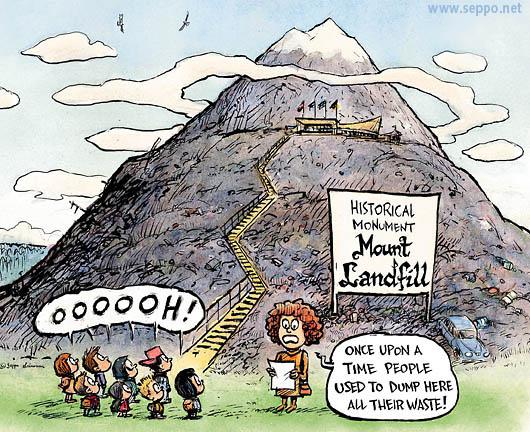
Zero waste working group
Auf die 2. internationaler Degrowth Konferenz in Barcelona (2012) hat ein Arbeitsgruppe über Zero-Waste sich getroffen. Die folgende ist ein "stirring paper" die als Grundlage für die Diskussion veröffentlich würde und die sicherlich interessant ist für die "Mullhändler" Gruppe ;)
Unten ist ein copy-paste von die PDF Quelle.
Working Group 9. Zero-waste:
How can we minimize the production of waste?
There is a strong correlation between income and waste generation, in per capita terms. Whereas rich countries have in occasions succeed in achieving high recycling levels, public policies have generally failed to reduce the overall generation of municipal solid waste (MSW).
Waste prevention should be the highest priority in waste management strategies, and actually that is already the case in many countries, at least formally.
In most cases, waste prevention does not only entail a direct reduction of waste flows, but these are also minimised during production and distribution. That is clearly the case when waste prevention derives from reduced consumption of superfluous products (e.g. carrier bags, flyers, etc.). In some particular cases (e.g. in some cases of miniaturisation), waste prevention may lead to increased waste generation in other stages of the production process.
Take-back schemes guarantee high capture rates and constitute an instrument to prevent MSW when applied to re-usable products, such as refillable bottles. Results achieved by several international experiences (e.g in Germany or Sweden) confirm that this should be one of the main waste prevention policies.
Home composting is also considered a waste prevention strategy. It is also a very appealing alternative in economic terms, since it reduces the need for waste collection, transportation and treatment in biowaste facilities. Mulching or smart gardening could be other strategies to prevent generation of green waste.
Waste prevention of products deemed to be particularly problematic from an environmental perspective could also be addressed by means of specific taxes. Possible taxes –based in already existing experiences– could target: carrier bags, disposable tableware, one-way packaging, batteries, tyres, light bulbs, etc. Their consequences may be both waste prevention and increased used of more environmentally friendly alternatives.
The idea of immaterial consumption (sport, culture, music, etc.) is promising, but further research is needed to make sure that avoided direct waste generation does not derive in increased indirect waste generation (of industrial waste, for example).
Other actions should be taken by Public Administrations to prevent waste generation, such as: increased adoption of public procurement, rising environmental awareness, promotion of reusable products (such as reusable nappies), promotion of ecodesign (e.g. for packaging), prevention of food wastage, promotion of tap water, etc.
There is a need for legal objectives regarding waste prevention, particularly at regional and national level. Relative objectives may be helpful (e.g. quantity of packaging per unit produced), but absolute objectives (in terms of quantity of waste generated in relation to a base year) are particularly necessary.
Despite waste prevention should be the top priority, degrowth should also address the refuse fraction, i.e. waste that is not recycled and ends up in landfill and waste incinerators. In this sense, separate waste collection is a must, particularly for biowaste. Door to door collection and pay-as-you-throw schemes have proved to be particularly efficient in terms of quantity and quality of waste collected. Increasing the relative cost of landfills and waste incinerators by means of specific taxes fosters waste prevention and recycling, since these facilities compete with other more environmentally friendly alternatives.

- 764 reads
Comments